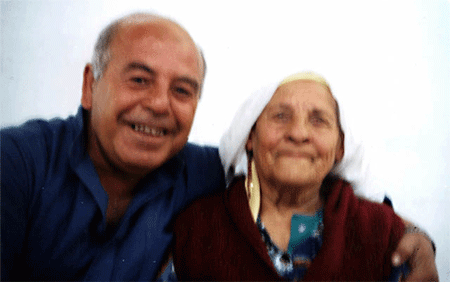
Ahmad Abdallah with his mother.
|
 Ahmad Abdallah with his mother. |
| Ahmad Abdallah, Jabaliya camp, April 20:
|
|
Ahmad Abdallah is the second man I record with in Gaza. He is also exceptional in another way. Most of the people I've recorded with so far have been relatively unknown (except perhaps Na'ima al-Helou and Mariam Abu Dakka). But Ahmad Abdallah has traveled extensively, has friends abroad, and is known to most foreign journalists here. But it's mainly his extraordinary story of surviving the war of 1948 that makes me decide to record with him. His entire family except for himself and his mother were killed in an Israeli air-raid as they fled from his village. At the time, he was a baby of a few months old. His mother was wounded. Both almost died. The story of her finding him, and her struggle to keep them both alive is extraordinary.
Today I find him, a grey-haired man in a brown dishdasha, in a simply furnished but spacious home in Jabaliyya camp, distinguished by rows of books. He is father of several children, some of them already students. His mother still lives with them. (One failure of my Gaza trip that I bitterly regret is that the photo I take of them is poorly focused and blurry.) This is a testimony that shows, among |
other things, how displacement triggers a drive for recuperation in the broadest sense. Umm Ahmad's original family and village re-grouped in Gaza near Jabaliya camp. She worked to support herself and her baby son. She worked and cared for him with every fibre of her being because from him her lost family would be regenerated.
And so it was. Almost annihilated in 1948, fifty years later her family exists again; even the names of some of her children who were killed have been re-used. Ahmad Abdallah's story tells more than this: how he built his life as a teacher and community activist from zero, impelled to reach beyond immediate personal or family necessities. In his narrative home appears less as a place of shelter than as a centre from which to advance a whole community and people. Ahmad Abdallah begins his story:"In 1947 when Israel made its plan to occupy all of Palestine, they tried to occupy the village (beled) that I'm from, its name is Huleiqat. They tried to occupy this village because they considered it the key to the Nagab -- if they controlled it the whole of the Nagab would be open to them..." |
[Na'ima al-Helou..] [Zahira 'Attallah] Copyright©2005 |
|